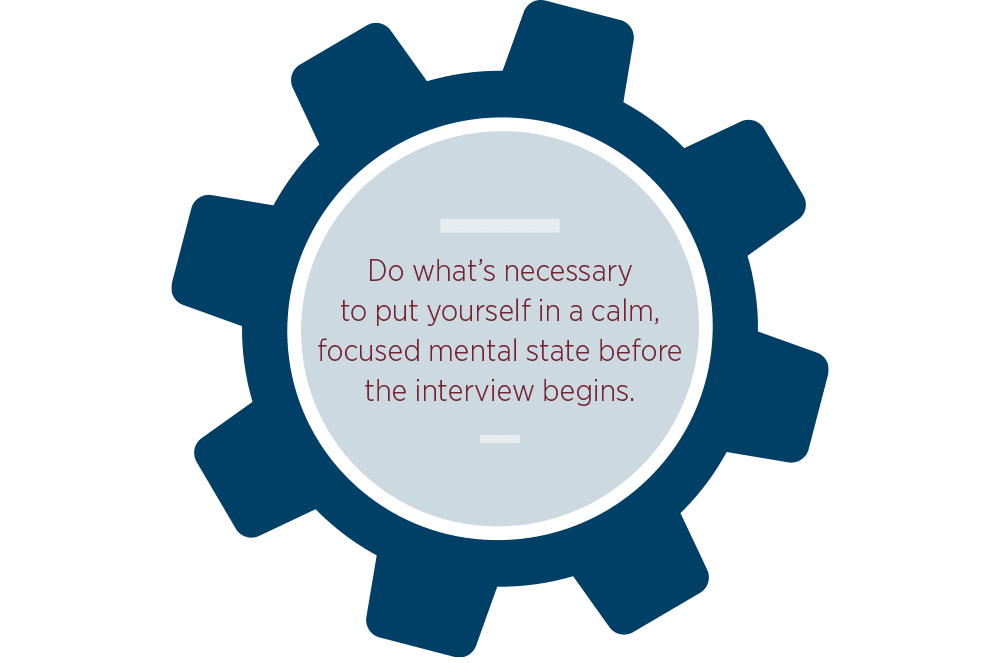
Strong interviewing skills are more important than ever to help you stand out in today’s challenging job market. They enable you to communicate your relevant strengths and ensure you have the information needed to make an informed decision.
Whether you interview in person or online—or both—the proper preparation, delivery, and mindset will go a long way to helping you land the right job.
Preparation
“Preparation is critical for three reasons,” says Paul Binkley, Ed.D., career development manager at George Washington University in Washington, D.C. “It helps you reduce anxiety and stress, put your best foot forward, and get the information you need.”
Do your due diligence.
Preparation for a job interview begins long before you apply for a position. It’s important to reflect on your strengths, weaknesses, values, interests, and priorities before you start your job search.
Keep those things in mind when considering opportunities. Also, conduct research on the job and organization before you apply. Review its website and dig deep, including reading the organization’s press releases and reports.
If you’re invited for an interview, it’s time to revisit your research and do even more.
See if you have any connections who work there—or used to—to learn inside tips. You want to know as much about the organization as possible.
Be sure you ask the person who schedules the interview about what type it will be, the structure, and what you can expect overall. Will the interview be in person or online? If online, will you meet with a person, or will it be a video interview (also called a one-way), where you record your answers to pre-set questions for later review.
If the interview will be live (as opposed to recorded), will it be with one person or multiple people? Will you have a series of interviews with a combination of people? If you can, find out interviewers’ names and titles so you can research them and understand their roles.

Develop potential answers.
It’s also time to reexamine the skills and experiences requested in the job description. Prepare examples of how you’ve demonstrated each one.
“Writing out the answers is key,” says Binkley. “But don’t try and memorize your answers word by word. If you try, you’re going to be so into the words, you’ll forget the message you’re delivering.”
Don’t use artificial intelligence (AI) tools to write out your answers for you. “The interviewer wants to hear your answers to find out what you think and about your experience,” says Heather Campbell, Ph.D., head of career services at Central European University in Vienna, Austria. “Any indication that you are being helped by AI in your interview will not only result in not getting the job, but may give you a bad reputation at that organization generally.”
Based on your research, brainstorm all the questions you could be asked. “If you have tried to anticipate a variety of questions, you are less likely to be surprised,” says Campbell. She also recommends practicing your hardest questions even more.
Practice.
Use techniques for structuring your answers like STAR (Situation, Task, Action, Result) or CCAR (Challenge, Context, Action, Result). Campbell says she prefers the CARL method (Context, Action, Result, Learning) “because it includes talking about how you have developed as a person and how that might affect your future work.”
For more practice, ask for a mock interview at your alma mater’s or community job center. Or see if your club can lead an interview-focused Table Topics® session or if a fellow member or friend can help you practice. At a minimum, say your answers out loud, whether in an empty room or in front of a mirror.
Do a dry run.
If you’re interviewing online, make sure your computer is fully charged. Have a backup plan—like a fully-charged phone—in case your computer crashes. Minimize anyone else using your home Wi-Fi network at the same time.
Understand what’s visible in your background. Arrange the best camera angle and lighting. Be in a quiet space or have quality earphones to minimize noise.
For an in-person interview, know where you’re going and how you’ll get there. Test the route out ahead of time. If driving, plan where to park. Be sure you arrive early, but don’t check in for the interview until 5–10 minutes before it’s scheduled.
By preparing, you will lower your anxiety and nerves. This will allow you to focus, minimize distractions, and adjust more easily in the moment.
“If you have tried to anticipate a variety of questions, you are less likely to be surprised.”
—Heather CampbellDelivery
For any interview, dress appropriately. Always choose professional attire unless you’re instructed specifically to dress a certain way or you know the industry and are confident of interview expectations.
Have the questions you want to ask written down and something on which to take notes. Consider writing a short, bulleted list of the key areas you want to highlight about yourself to ensure you cover everything.
Do what’s necessary to put yourself in a calm, focused mental state before the interview begins. This will help you slow down when speaking, be in the moment, and be aware of interviewers’ verbal and nonverbal cues. Whether online or in person, eye contact is important.
Binkley says not to overthink it if something unexpected happens—like a cat strutting in your background if you’re online. Use your Toastmasters experience to refocus. “Things happen,” says Binkley. “It’s how you react that makes all the difference.”
In person.
When meeting in person, take your résumé, cover letter, and any other relevant materials with you. If you’re interviewing with multiple people at one time, start and end each response by looking at the person who asked the question. In the middle, look at others to engage them and see how they’re responding to what you’re saying.
Online.
There are two main kinds of online interviews—one with people in real time, and one using video. For both, remember to look at the camera; this will create the effect of having eye contact with your interviewer. Consider taping a note next to your camera with a smiley face to help you remember.
When speaking to people in real time, have the camera situated so you can look at it and see how the interviewers are responding to your answers. “Be yourself and be natural,” advises Binkley. It’s also important to be more expressive online, he adds, because you can’t convey nonverbal cues as effectively as in person.
A growing number of organizations are using video/one-way interviews to screen candidates. If assigned this type of interview, be sure to ask about time limits and how many chances you’ll have for each response.
Binkley says video interviews can be awkward and more stressful because you’re not interacting with anyone. “You’re given questions and you record yourself answering,” he says. “Sometimes you’ll only get two or three attempts to give an answer. Oftentimes, there’s a timer on the screen.”
Don’t be fooled into thinking artificial intelligence will help you ace the process.
“You see a lot of misinformation out there about ‘beating the computer’ when it comes to job applications and interviews,” says Campbell. “But I do not know of any organization that has delegated recruitment decision-making to AI.”
Instead of worrying, Campbell recommends you try to understand the interview approach and think of the message you are trying to deliver. “In terms of interviews,” she says, “the AI program [will] be looking for things like keywords in your answers, length of answers, clarity of answers. … These are all things that a human will be looking for too. So, as ever, make sure you talk slowly and clearly, structure your answers, and don’t ramble.”
Mindset
Remember, a live interview is a two-way street. You’re interviewing the organization just as much as they’re interviewing you. Be sure to ask questions and get the answers you need to determine if this opportunity is right for you.
Recognize that in most cases, just like when you’re giving a speech, people want you to do well. To ensure the job and organization are a fit, be authentic.
“I think what many people forget is that, be it online or in person, there is the human element of interviewing,” says Campbell. “Remember, interviewers are just people, and you are just having a conversation.”
Jennifer L Blanck, DTM has more than 25 years of career development and advising experience. She is a member of 5-Star Toastmasters Club in Arlington, Virginia, and AAMC Toastmasters in Washington, D.C., as well as a regular contributor to the Toastmaster magazine. Learn more at jenniferlblanck.com
Related Articles

Club Experience
How Clubs Can Help Job Seekers

Personal Growth
Master the Art of Interviewing

Technology



 Previous
Previous

 Pathways Level 3 Elective Project
Pathways Level 3 Elective Project
 Previous Article
Previous Article